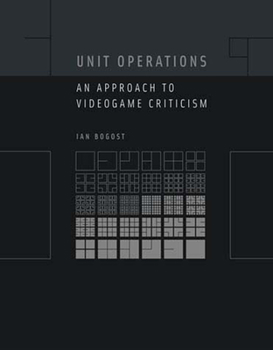Unit Operations: An Approach to Videogame Criticism
Select Format
Select Condition 
Book Overview
The richness of Bogost's comparative approach can be seen in his discussions of works by such philosophers and theorists as Plato, Badiou, Zizek, and McLuhan, and in his analysis of numerous videogames including Pong, Half-Life, and Star Wars Galaxies. Bogost draws on object technology and complex adaptive systems theory for his method of unit analysis, underscoring the configurative aspects of a wide variety of human processes. His extended analysis of freedom in large virtual spaces examines Grand Theft Auto 3, The Legend of Zelda, Flaubert's Madame Bovary, and Joyce's Ulysses. In Unit Operations, Bogost not only offers a new methodology for videogame criticism but argues for the possibility of real collaboration between the humanities and information technology.
Related Subjects
Business & Management Chemical Communication & Journalism Communication & Media Studies Computer Science Computers Computers & Technology Culture Engineering Game Programming Games Graphics & Visualization Media Studies Politics & Social Sciences Programming Puzzles & Games Social Science Social Sciences Textbooks Video & Electronic Games





